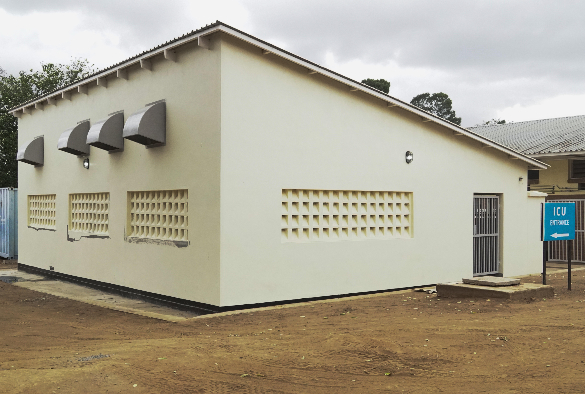As part of its COVID-19 response, the Malawi-Liverpool-Wellcome (MLW) Programme recently opened an oxygen concentration plant, which will produce over a million litres of oxygen a day for Blantyre’s Queen Elizabeth Central Hospital and surrounding facilities.
The oxygen plant was opened by Malawi’s Minister for Local and Rural Development, Dr Ben Phiri. The plant is in part funded by a grant from MLW partner, the Wellcome Trust, which provided the Programme with over £2 million. This was also used to provide PPE, so that the risk that staff faced from COVID-19 can be reduced. This in turn benefits not just those suffering from the virus but patients seeking medical care within other services, including HIV and TB Treatment, maternity care and paediatrics.
Working in partnership with a partially completed government project, MLW procured and installed the oxygen concentration plant, which will supply oxygen to the 100 specialist beds within the hospital, but that will also be able to fill bottles that can be taken off site to other settings nearby, ensuring oxygen is available to all with a clinical need in the region.
Professor Stephen Gordon is MLW’s Director. He said: “With almost no supplies of oxygen in the health system in March, this plant will make a massive difference. It was not without its own challenges though, as the cessation of all commercial flights meant that the engineers building the plant could not travel from South Africa. We are grateful that Illovo Sugar South Africa Limited offered us their company jet to ensure that the engineers were able to get here to complete the project. The plant itself will have a lasting legacy within Malawi, as post COVID the plant will be vital in the ongoing treatment of those suffering from TB, pneumonia, HIV related lung conditions and those suffering from chronic lung disease.”
MLW is a partnership between the University of Liverpool, Liverpool School of Tropical Medicine, the University of Malawi’s College of Medicine and the Wellcome Trust, and in the 25 years since its formation has changed health in the country, with particular impact on malaria, pneumonia, childhood diarrhoea, typhoid, HIV and TB.
Malawian minister of Local Government Honorable Ben Phiri (in black face mask) opens the oxygen plant
